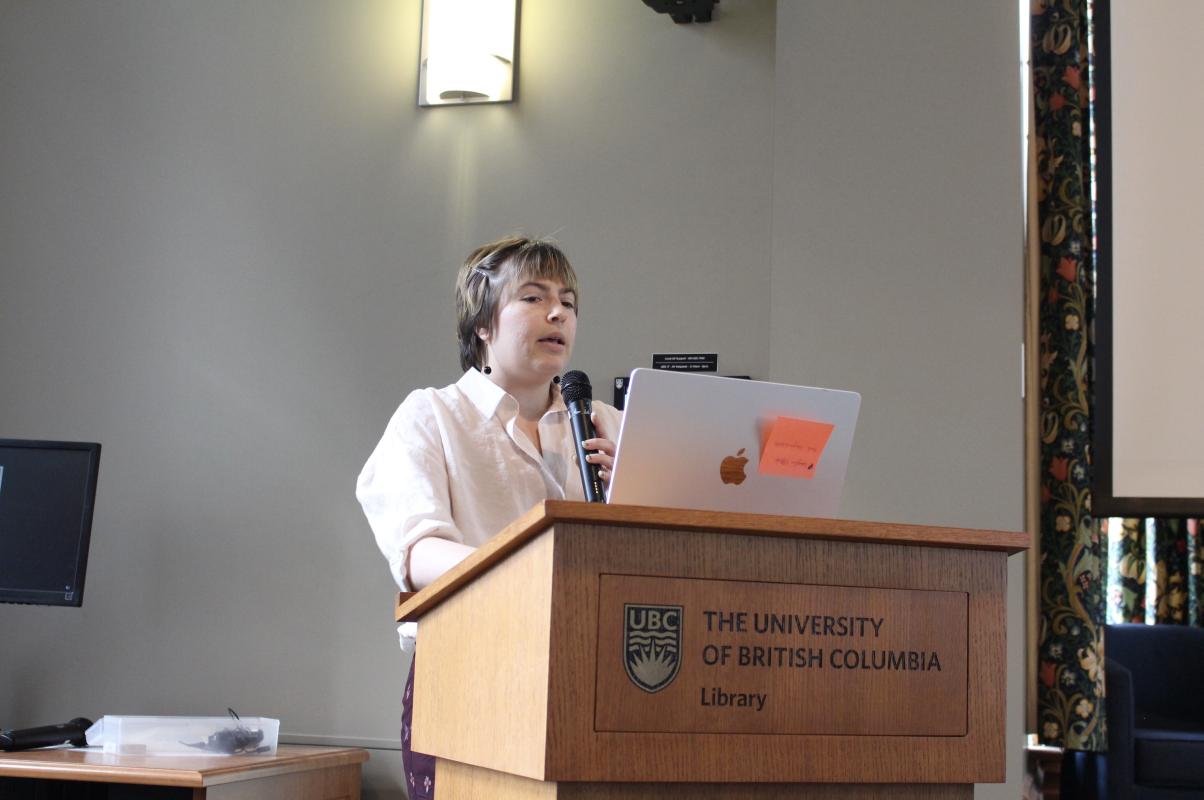Best Talk Award - Danica Reid (Linguistics, SFU)
Title: Comparing In-person and Remote Recording Methods for Phonetic Field-work
(This is one of two Q&As with award-winning presenters at the Research Day. To read the other, please follow the link at the bottom of this article.)
1. We would love to know more about the origin story of your research. What drew you to this field and what inspired you to present on this topic?
In the first year of my PhD program, despite wanting to focus my doctoral research on how children acquire Canadian English, I signed up for Field Methods at UBC through the Western Deans Agreement. In the class, run by Dr. Lisa Matthewson, we got to meet and work with three fluent speakers of nɬeʔkepmxcín on a weekly basis. It was such a great experience learning about how to conduct linguistic fieldwork while simultaneously getting to know the speakers and learning from them. I have continued working with the same three speakers and with other members of that Field Methods class in the nɬeʔkepmxcín Lab (nɬab) and haven’t looked back since.
The work I presented at the 2025 Research Day stemmed from my interest in the methodological side of fieldwork. While working with the nɬeʔkepmxcín speakers in Field Methods, I conducted an acoustic analysis of the nɬeʔkepmxcín aspiration system. Because we weren’t able to go up to nɬeʔképmx territory during the class itself, the majority of the elicitations were done over the video conferencing platform Zoom. I had found some previous research about the audio quality of Zoom recordings that suggested that Zoom should be avoided for phonetic fieldwork and wanted to see how measures of aspiration compared across traditional in-person recording methods and these remote Zoom recordings. Zoom can be such a useful tool for fieldwork, especially when it is not always possible to meet with language speakers in person. I hope I showed in my presentation that as long as we as researchers are careful to document our methodology and verify our findings with additional recording methods that Zoom can be a tool in our documentation and revitalization toolbox.
2. Tell us a little bit about your experience on Research Day 2025. How did you find the event, and what do you think it means for graduate research in British Columbia?
This was my third time presenting at the UBC Language Sciences Graduate and Postdoctoral Research Day. I’ve really enjoyed how the event brings together researchers from a variety of fields and schools. I spend most of my time with linguists, so seeing the depth of research that is being done on and with language is always so interesting to me. Grad school can be a bit isolating at times, but events like this are a great reminder that there are plenty of other graduate researchers who are doing such interesting work in the realm of language research.
3. Looking ahead, where do you see your research taking you in the next few years?
This is a question I have such a hard time answering. I really love the work that I am able to do right now and I hope that in the years to come I will get to continue working with the members of the nɬeʔképmx community that we have gotten to know in nɬab. For now, the goal is to continue working with my amazing consultants to document aspects of the phonetic and phonological system of nɬeʔkepmxcín and determine ways that linguistic theories can be adapted to help language learners within the community.
4. How do you think universities can better support graduate research initiatives?
Unfortunately, one of the main ways that universities can better support graduate research initiatives is to fund graduate research at a higher level. While that’s not something that is always feasible, I think that having these types of events where graduate research is highlighted and celebrated is super important.
Read Q&A with Laurie He, winner of the Best Poster Award at Language Sciences' Graduate and Postdoctoral Research Day 25'.
